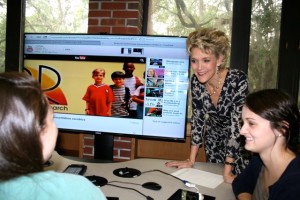WJCT Public Radio: Suzanne Colvin–Quality education for all
WJCT-FM Public Radio
4-15-14
Suzanne Colvin interview
The COE Office of News and Communications worked with the UF University Relations/Communications Office in connecting Dr. Suzanne Colvin with WJCT Public Radio on one broadcast interview and two print stories that appeared on the station’s website. Colvin spoke about “The Quest for Quality Education For All: Mending the Broken Trust.”
LINK: http://news.wjct.org/post/quest-quality-part-ii-mending-broken-trust
Note: Dr. Colvin’s interview responses are three minutes and 49 seconds (3:49) into the interview and last about one minute. Click the listing bar just to the left of the halfway mark to find it.





